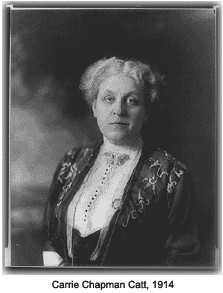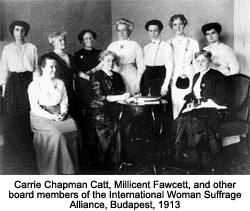"... No chance, no destiny, no fate, can circumvent or hinder or control the firm resolve of a determined soul. Gifts count for nothing; will alone is great."
— Carrie Chapman Catt, founder of the League of Women Voters.
The League of Women Voters is America's premier grassroots citizen organization. Founded in Chicago, the league was formed within the National American Women Suffrage Association, and composed of organizations in the states where women's suffrage had already been attained. The league was formally organized in February 1920, six months before the 19th Amendment to the Constitution was ratified, which gave women the right to vote following a 57-year struggle.
 Founder Carrie Chapman Catt, a feminist and effective leader in the suffragist movement, envisioned the "union of all intelligent forces within the state" to break down "illiteracy, social evils, and industrial ills." Since its inception, the league has helped millions of American citizens become informed participants in government.
Founder Carrie Chapman Catt, a feminist and effective leader in the suffragist movement, envisioned the "union of all intelligent forces within the state" to break down "illiteracy, social evils, and industrial ills." Since its inception, the league has helped millions of American citizens become informed participants in government.
The league first strove for legislation to improve the quality of life for Americans, including child labor laws, a minimum wage, and equal opportunity for women in government and industry. One of the first bills the league supported was the Sheppard-Towner Act (1921), which provided federal aid for maternal and child care programs. That was the first federally funded social welfare measure in the United States. The act was designed to reduce high maternal and infant death rates in the United States during the 1920s. Lawmakers opposed the use of federal funds for social welfare programs and felt threatened by such reforms. Nevertheless, the successful campaign to pass the Sheppard-Towner Act was the league's first use of grassroots organization and citizen education to galvanize citizens into action.*
 Not long after its founding, the League expanded into the areas of world peace, as well as civil and human rights. The League labored for U.S. membership in the League of Nations and the World Court.
Not long after its founding, the League expanded into the areas of world peace, as well as civil and human rights. The League labored for U.S. membership in the League of Nations and the World Court.
During the 1930s, the League fought to solve a government corruption issue in which hundreds of federal employees were politically supported in their government jobs. The league was the only national organization to consistently advocate the merit system, which eliminated the practice of awarding federal jobs under the "spoils system" and, instead, held that federal job selection and promotion should be based on individual merit, or virtue. Due, in no small measure, to the League's campaign, legislation passed in 1938 and 1940 to place these jobs under civil service.
The league also supported legislation to develop the Tennessee River basin as the site of a publicly owned power facility. In 1933, Congress established the Tennessee Valley Authority (TVA), to undertake both conservation and multipurpose development of the basin's natural resources. That was the beginning of the league's involvement in environmental issues. Since then, the League of Women Voters has crafted broad national positions on such important environmental issues as water pollution, air pollution, water management, waste management, energy, and land use. The league's network worked for enactment and implementation of the Clean Air Act and the Clean Water Act. They have also confronted such problems as poverty, discrimination, substandard housing, lack of public transportation, andways to encourage and support conservation.
Civil and human rights were important issues for the League in the 1960s and 1970s. The League solidly supported ratification of the Equal Rights Amendment.** The league regarded "equal rights for all regardless of sex" as a fundamental and necessary detail of its long-term support for equal opportunities in education, housing, and employment. In addition, beginning in 1974, men were admitted to the league as full members.
In the 1980s, the league endorsed the constitutional right of individuals to make reproductive choices, as confirmed by the controversial 1973 Supreme Court ruling on the historic Roe v. Wade case.
In the 1990s, the league's Education Fund began a project to help guide the civic education of women in emerging democracies. In addition, the league worked successfully for the passage of the National Voter Registration Act, as a means to register more Americans, simplify voter registration, and reshape the government's role in the registration process. The league is currently involved in working for campaign finance reform, health care reform, and effective gun control.
The League of Women Voters continues to encourage and support women as well as men in their quest for full participation in American democracy. The league's impact is felt at all levels of government — local, state and national — and the organization's work is based on the belief that citizens with well-researched and unbiased information will make wise choices for their communities and their nation.